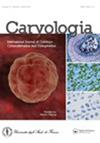Cytogenetic survey of eight ant species from the Amazon rainforest
IF 2.1
4区 生物学
Q2 Agricultural and Biological Sciences
引用次数: 0
Abstract
The scarce information regarding ant diversity in the state of Amapá and lack of cytogenetic data of species from the Amazon region can hide ant biodiversity information that may be detectable with affordable cytogenetic techniques. In this study, we describe the karyotypes of eight ant taxa collected from Amazonian localities in French Guiana and Brazil. Chromosome numbers ranged from 2n = 18 to 2n = 68. The following chromosome numbers were observed for each species: Azteca sp. group chartifex 2n = 28; Dolichoderus bidens (Linnaeus, 1758) 2n = 18; Gnamptogenys tortuolosa (Smith, 1858) 2n = 44; Camponotus renggeri Emery, 1894 n = 20; Pseudomyrmex unicolor (Smith, 1855) 2n = 68 and n = 34; Apterostigma sp. pilosum complex 2n = 46; Odontomachus bauri Emery, 1892 2n = 44, and Wasmannia auropunctata (Roger, 1863) 2n = 32. The karyotypes of P. unicolor, G. tortuolosa, and O. bauri are reported here for the first time. Our data enabled comparisons between chromosomal data of some species from Amazon and Atlantic rainforests. We also highlight the methods used for the ant chromosome classification.亚马逊雨林八种蚂蚁的细胞遗传学研究
由于亚马逊河流域蚂蚁多样性信息的缺乏和亚马逊河流域物种细胞遗传学数据的缺乏,这些信息可能会被隐藏起来,而这些信息可能会被负担得起的细胞遗传学技术检测到。在这项研究中,我们描述了从法属圭亚那和巴西亚马逊地区收集的8个蚂蚁分类群的核型。染色体数目从2n = 18到2n = 68不等。各物种的染色体数目如下:Azteca sp. group chartifex 2n = 28;bidens (Linnaeus, 1758) 2n = 18;Gnamptogenys tortuolosa (Smith, 1858) 2n = 44;Camponotus renggeri金刚砂,1894 n = 20;Pseudomyrmex unicolides (Smith, 1855) 2n = 68, n = 34;无翼柱头sp. pilosum复合体2n = 46;Odontomachus bauri Emery, 1892年2n = 44, Wasmannia auropunctata (Roger, 1863年)2n = 32。本文首次报道了单色假单胞菌(P. unicolor)、龟甲假单胞菌(G. tortuolosa)和鲍氏假单胞菌(O. bauri)的核型。我们的数据可以比较来自亚马逊雨林和大西洋雨林的一些物种的染色体数据。我们还强调了用于蚂蚁染色体分类的方法。
本文章由计算机程序翻译,如有差异,请以英文原文为准。
求助全文
约1分钟内获得全文
求助全文
来源期刊

Caryologia
生物-遗传学
CiteScore
1.60
自引率
23.80%
发文量
26
审稿时长
12 months
期刊介绍:
Caryologia is devoted to the publication of original papers, and occasionally of reviews, about plant, animal and human karyological, cytological, cytogenetic, embryological and ultrastructural studies. Articles about the structure, the organization and the biological events relating to DNA and chromatin organization in eukaryotic cells are considered. Caryologia has a strong tradition in plant and animal cytosystematics and in cytotoxicology. Bioinformatics articles may be considered, but only if they have an emphasis on the relationship between the nucleus and cytoplasm and/or the structural organization of the eukaryotic cell.
 求助内容:
求助内容: 应助结果提醒方式:
应助结果提醒方式:


